Top Tips for Hitting the Ski Slopes
Posted in General on 19 December 2017
InsuraTrip’s Top Tips for Hitting the Ski SlopesOur advice for travellers planning a snowy getaway this winter
December 2017
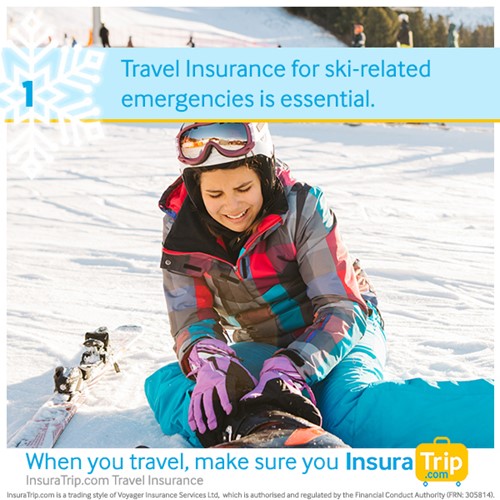
1. Make sure you have Travel Insurance that will cover you for ski-related emergencies.
Unfortunately, many travellers do not check their travel insurance before they depart on their winter break, assuming that winter sports activities will be covered under an Annual Travel Insurance policy purchased the previous summer for a beach holiday. Similarly, many travellers think that essentials or winter sports will be covered by an insurance policy that came ‘free’ with their bank account.
When it comes to Winter Sports, ignorance is not bliss - it is more likely to be an incredibly large bill if something unexpectedly goes wrong or ‘snap’! There is no such thing as free health care or repatriation on ski resorts, so your EHIC (European Health Insurance Card) will not be able to help you there. Don’t forget, your EHIC only works in government facilities and does not cover repatriation, air ambulance or ski equipment; most health-related services are privately run and will come with a hefty fee for usage.
Before you travel:
- Check your travel insurance policy, specifically for Winter Sports Cover.
- Ensure that you are covered for the dates that you will be travelling, specifically the policy expiration and the maximum number of days that the policy allows for Winter Sports participation cover.
- Make sure any activities that you intend to participate in are covered. This doesn’t just include skiing and snowboarding, but also activities that you may do for fun whilst on holiday such as heli-skiing, ice skating, sledding and paragliding etc.
- If your existing policy does not include Winter Sports Cover, contact your insurer to see if this cover can be added to your policy. If this is not the case, then it is strongly recommended that you purchase a new policy to ensure you have adequate cover.
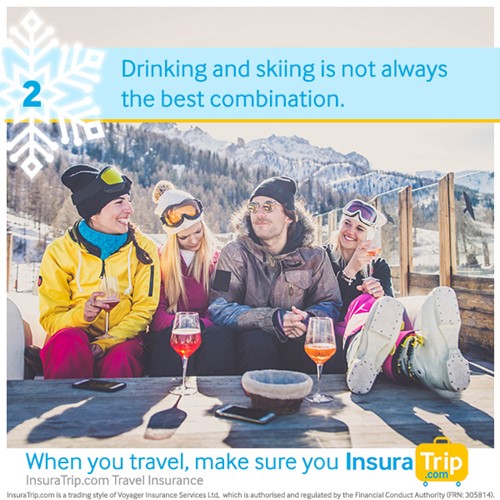
2. Drinking and skiing is not always the best combination.
Not only will alcohol dull your senses and increase the likelihood of being involved in an accident, it is also fairly standard for Travel Insurance policies to exclude cover for claims made whilst the policy holder was impaired and ‘under the influence’ of alcohol. Enjoy your holiday, but bear in mind your limits and be careful.
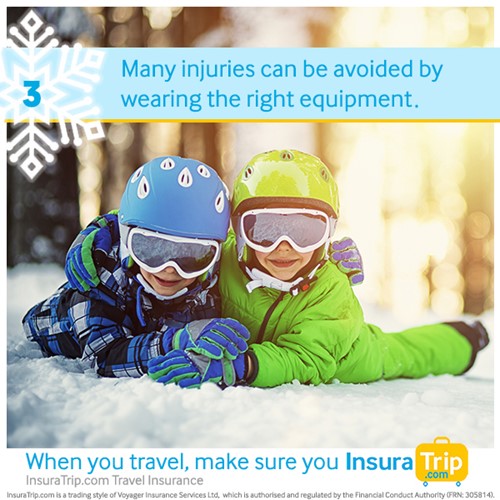
3. Wear a helmet.
Many serious injuries reported every year could be avoided by wearing the right equipment, such as a helmet.
Technically, apart from certain resorts in Nova Scotia such as Ski Wentworth and Cape Smokey, once you are over the age of 18 years old you do not legally have to wear a helmet while on the slopes. You will find that certain resorts strongly recommend or insist that you wear helmets regardless of age and it is respectful to follow local custom, but this does not make helmet-wearing compulsory. It is also important to consider that many travel insurance policies require you to wear a ski helmet – so check your policy documents…
However, for children helmet-wearing is a different matter. Depending upon age and location, in many countries it is a legal requirement for children under a certain to age to wear a helmet. For example, in Italy helmet wearing is compulsory for children under 14 years of age.
Helmet Tips:
- Do not wear a wooly hat underneath your helmet – a helmet should be snug, and a modern helmet should keep your head warm, without requirement for a hat. If it gets really cold and you would like an extra layer you should consider a thin silky liner or a balaclava that has been specifically designed for helmets.
- If you don’t want to transport a helmet, you should be able to hire one from the ski resort where you are staying.
- Do not leave your helmet unattended. There is a good chance your travel insurance will not cover you for lost or stolen equipment if it was left unattended.
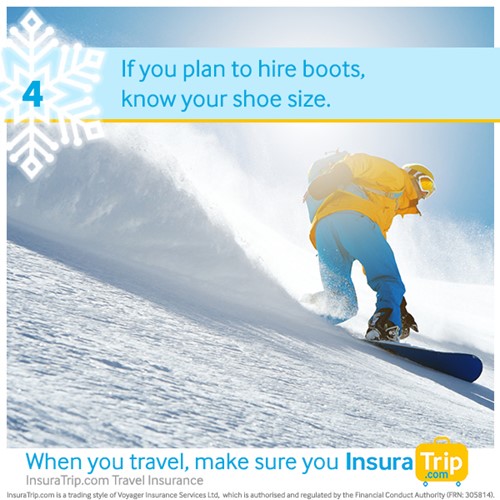
4. Know your shoe size.
Shoe sizes differ depending on the country that you are visiting, so remember to check out your shoe sizes before you leave! Unlike the UK, Continental Europe measures your feet in centimetres and ski boots are measured using the Mondopoint system, but luckily sizing can be easily checked online before you even depart.
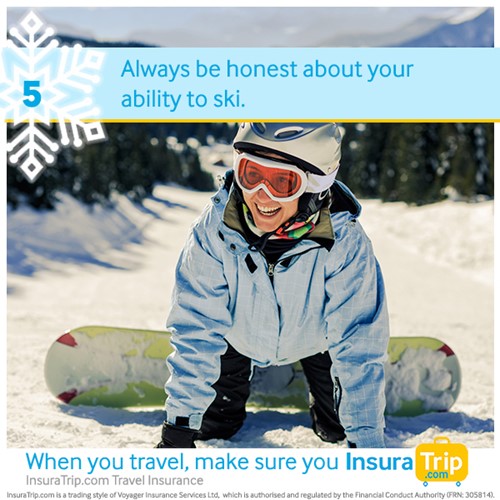
5. Know your ability.
Always be honest about your ability to ski and never feel embarrassed to take it easy and start on green or blue runs.
We recommend:
- If you have never been skiing or snowboarding before, lessons will help you to pick up good techniques and habits for the future. Most resorts offer both group and one-on-one lessons for a fee.
- You don’t need to wait until you get to your winter destination to practice – many places in the UK have indoor wet or dry ski slopes, providing year-round lessons and practice sessions.
- When you first arrive at your resort, even if you are an experienced skier it is a good idea to practice on a green run first and work your way up to the more difficult runs.
- If you are hiring any essentials, ensure that you are honest about your ability to the people supplying your equipment, as they will adjust your equipment where possible to cater to your needs.
- If you are a beginner, you likely will not need an expensive lift pass that covers the whole of the resorts terrain. Research the best lift passes for beginners at your resort before you travel, and you may find that you save some money.
- Do not listen to peer pressure. If you are a beginner, do not let peers convince you to try and take on an advanced level slope – this is dangerous and you may accidentally hurt yourself or someone else.
- Stick to the correct parts of your ski resort! Many winter sports policies exclude off-piste skiing, so if you are capable and tempted to go ‘off-piste’ be sure to check the small print first.
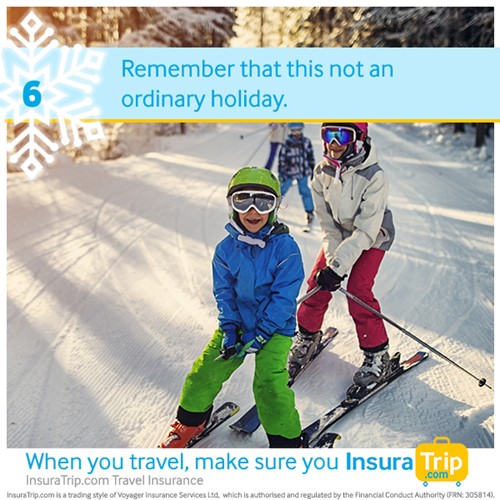
6. Remember that this is not an ordinary holiday.
As such, many ski-related perils and issues will likely not be covered by regular travel insurance policies unless you have confirmed winter sports cover. For example:
- The repair or replacement of Winter Sports Equipment (owned or hired)
This includes things like skis, ski bindings, ski boots, snowboard bindings and snowboards.
- The loss of use of your Ski Pack
This includes things such as ski hire, ski lift pass and ski school fees.
- The proportionate cost of your unused Lift Pass if it is misplaced, lost or stolen on your trip.
- The inconvenience of Piste Closure due to a lack of snow, which results in the total closure of skiing facilities at your resort.
- Incurring additional transport and/or accommodation fees due to Avalanche & Landslide Closure
It is also worth noting that if you were to be involved in a medical emergency whilst travelling, some policies such as InsuraTrip Winter Sports Cover will provide cover for Physiotherapy in the UK once you have returned home, following an injury occurring during your trip*.
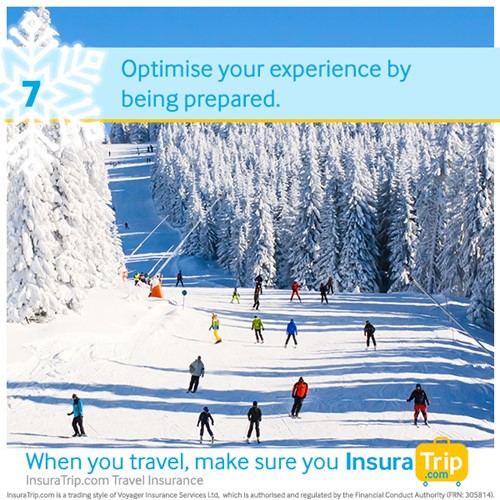
7. Be prepared.
It’s a good idea to be organised and aware of anything that could affect your trip, for the good or the bad, to optimise your experience. Such as:
- Make arrangements to either take, or hire, adequate equipment.
- Know the resort - take a map out with you if you can, so that you can find everything from particular runs, to toilets and restaurants.
- Check the running times for gondolas and chairlifts, to ensure that you effectively maximise your time on the slopes (and don’t get stuck anywhere unexpectedly!).
- Ski passes can often be purchased for a discount if you attend a resort during early or late season, travel as a group or a family, or if you are disabled. Additionally, some resorts also provide free passes for small children and adults over a certain age.
- Keep an eye on the weather during your trip – adverse weather and events can cause disruption.
- In particularly cold weather be vigilant of tell-tale signs of primary frostbite, especially on your companions. Initial signs may show up as white-marbled patches on numb-to-touch skin of exposed areas, such as the face.
- Before you travel, work on your fitness. Skiing and snowboarding can be exhausting, particularly within the harsh climate of snow and ice. Working to improve your general fitness before you travel will go a long way on the slopes.
- Don’t be fooled by the snow… take sun cream.
Do you need Winter Sports Travel Insurance?
When you travel, make sure you InsuraTrip.
To find out more about InsuraTrip Winter Sports Cover, click here: Winter Sports Travel Insurance Information
To grab an instant online quote, click here: Winter Sports Travel Insurance Quote
Written by Evie
*Terms, Conditions, Limits and Exclusions apply. Please check the Policy Wording for the further information.
Other Related News Articles...
- Money Saving Tips for Your Wedding Day
- 4 European City Break Ideas for You to Consider This Autumn



